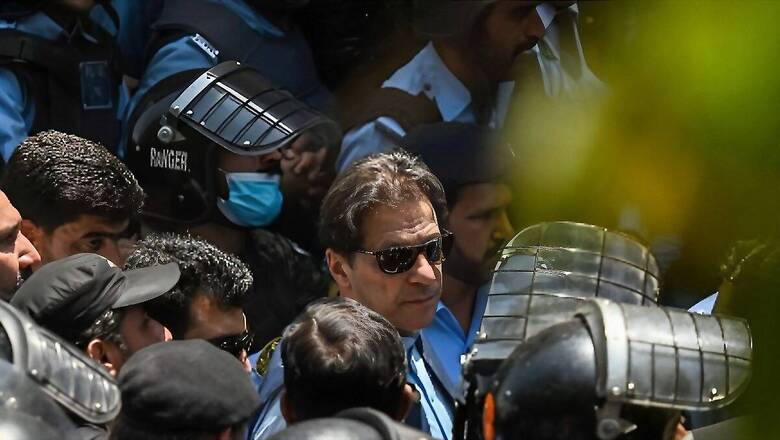
views
The recent agitations in Pakistan were sparked by the arrest of a popular politician, Imran Khan. Khan is a vocal critic of the military and his detention has infuriated Pakistanis. The current turmoil in Pakistan has created an opportunity for money launderers to exploit the situation. The country is in the grip of a terrible economic crisis, and there is significant political unrest. This makes tracking bank transactions and identifying suspicious behaviour difficult for law enforcement authorities.
In addition to corruption on a grand scale including allegations of embezzlement, bribery, and nepotism, the Pakistani military has also angered the citizens by interfering in politics. In recent years, the military has been accused of orchestrating the ouster of two elected Prime Ministers — Nawaz Sharif and Imran Khan — causing widespread resentment among the Pakistani people. They are also accused of human rights abuses, including torture, extrajudicial killings, and enforced disappearances.
The Pakistani military controls a significant portion of the Pakistani economy. This includes corporations, banks, and even media outlets. As a result, charges have been levelled that the military is abusing its economic authority to benefit itself and its allies. The Army was also accused of demanding bribes from the government to negotiate with the International Monetary Fund (IMF) for a bailout package. The army has been trying to attract foreign investment like the BRI projects, but in Pakistan, there have been suspicions of corruption concerning the BRI. For example, in 2018, the public raised concerns that the Pakistani military may have benefitted financially from the BRI. In 2020, a Pakistani publication stated that China had given the military a $1 billion loan to finance a BRI project.
The wealth of top military officials in Pakistan has been a source of controversy. According to a 2007 book by Pakistani military scientist Ayesha Siddiqa, the total fortune of Pakistan’s top 100 military personnel is at least £3.5 billion. Extrapolating in time, a 2019 research published by the Centre for Research and Security Studies (CRSS) indicated that Pakistan’s top ten military leaders were worth a total of $10 billion. According to a report published by the investigative website FactsFocus, General Qamar Javed Bajwa, the former Chief of Army Staff of Pakistan, has amassed a personal wealth of over Rs 12.7 billion (approximately $100 million) since assuming office in 2016. In short, Pakistan’s senior military personnel are extremely affluent. Some claim that it is unjust for them to be so affluent while the rest of the country struggles. Many military officers in Pakistan have business interests and own businesses in a range of industries, including construction, real estate, and media.
In Pakistan, the military owns a large quantity of land which is frequently utilised for commercial reasons such as agriculture or construction. In 2016, a report by the National Accountability Bureau (NAB) found that the military had illegally acquired over 100,000 acres of land which is estimated to be around 12 percent of the total Pakistan land area. Military officers in Pakistan are paid extremely well and given generous allowances. The Chief of Army Staff, for example, earns a salary of around $100,000 per month. There is a widespread perception that corruption is rampant in the Pakistani military. This corruption allows military officers to enrich themselves at the expense of the Pakistani people.
In 2015, Pakistan’s NAB found Gen Ashfaq Kayani guilty of corruption in government contracts granted to his family at inflated rates totalling more than $1 billion. The money was laundered to safe havens abroad and the case was later dismissed by the Supreme Court. Kayani is the recipient of the Hilal-i-Imtiaz, Pakistan’s highest civilian award. In 2016, the Supreme Court of Pakistan ordered an investigation and found that Gen Parvez Musharraf had assets worth over $1 billion. Musharraf laundered a sizable part of his ill-gotten gains and fled Pakistan to live in exile in Dubai. The former head of the Inter-Services Intelligence (ISI) agency, Lt. Gen. Zaheerul Islam was accused of corruption, mismanagement and being involved in the assassination of former Prime Minister Benazir Bhutto. The proceeds he gained, which he is accused of, have been laundered to the United Kingdom, where he resides now. In 2017, the NAB investigated Gen Raheel Sharif to find him worth $1 billion rich with his overall assets. Sharif took a leaf from Musharraf’s playbook and moved the money to the United Arab Emirates, where he is currently living in exile.
Maj. Gen. Safdar Khan, the son-in-law of former Prime Minister Nawaz Sharif was accused of money laundering and other financial crimes. He seemed to have followed in his father-in-law’s footsteps. In 2018, the Saudi government granted asylum to Lieutenant General Abdul Qayyum, who was accused of corruption. In the same year, the NAB found Lt. Gen. Asim Bajwa, the Pakistani military spokesperson having assets worth over $1 billion. He too laundered most of his money to evade extended charges. In 2020, the Chinese government granted asylum to Major General Akhtar Nawaz, who was accused of human rights abuses and had also laundered his fortune for bribing Chinese officials where he fled later.
The Panama Papers showed in 2016 that former Prime Minister Nawaz Sharif, along with numerous other prominent Pakistanis, held hidden offshore bank accounts. The Paradise Papers and Pandora Papers, which were released in 2017 and 2021 respectively, also shed light on the problem of money laundering in Pakistan. The NAB detained former Prime Minister Shahid Khaqan Abbasi in 2018 on money laundering accusations and former President Asif Ali Zardari on identical accusations in 2020.
Fast forward to all the corruption charges, the public outrage and the current situation of breakdown in Pakistan which the top brass of the Pakistani Army must be terrified of, as the political situation is unstable and the economy is in shambles. The country’s foreign exchange reserves are depleting and inflation is soaring. This has led to widespread discontent among the Pakistani people due to no meaningful reforms for the past three governments. Pakistan is facing a number of security challenges, including terrorism and sectarian violence. As a result, popular trust in the government and the military has dwindled.
The problem of greed, corruption and money laundering in Pakistan is a serious one. It deprives the country of much-needed revenue and undermines its economy, from which the current crisis gets its roots. The current situation of meltdown is threatening the Army’s grip on power and its overall stability. The Pakistani Army has traditionally played a dominant role in the nation’s politics and related financial misdeeds. However, the Army is worried that if the situation continues to deteriorate, it might spark a popular rebellion or civil war.
The destruction of military property is a worrisome development to public outbursts of their anger. It is a sign that the public has lost their faith in the military, and it could lead to further violence. On May 10, 2023, a mob of protesters set fire to the residence of Lieutenant General Faiz Hameed, the Corps Commander of Lahore, Pakistan. It was the first time that protesters had targeted a high-ranking military official. The demonstrators were supporters of Imran Khan, who had been deposed by the military just a few days before. The protesters accused the military of rigging the polls and of ousting Khan in a “regime change.” They also accused the military of corruption and human rights abuses. These attacks have further strained relations between the military and the civilian government and signify deep divisions in Pakistani society. This would be a major setback for the Army and could jeopardize its interests with the possibility of persecution.
Some Pakistani military top officials may flee the country if they feel that they and their families are in danger of being prosecuted for corruption or other crimes. The factors influencing an official’s decision to flee or stay would include the severity of the allegations, the quality of the evidence against them, and the likelihood of being convicted of corruption. This is where the laundering of monies comes into the picture. Wealthy military officials may try to launder money by setting up shell companies, making false investments, or using hawala networks.
Is it time to place Pakistan back on the Financial Action Task Force (FATF) “Grey List”, given the country is incapable to cooperate with other countries on security matters with its fallen legal system and resulting lacunas in monitoring its financial system? Pakistan was placed on the FATF “grey list” in June 2018 for 36 months, for its failure to meet international standards on combating money laundering and terrorist financing. In June 2021, the FATF extended Pakistan’s stay on the grey list for another four months for its perceived deficiencies in its AML/CFT (Anti-Money Laundering and Combating Terrorist Financing) regime. In October 2021, Pakistan was removed from the grey list. FATF has stated, however, that it would continue to monitor Pakistan’s progress in executing the action plan and will make a decision on whether to reinstate the nation on the grey list in June 2023. Seems like the current legal system collapse will usher Pakistan into this list once again.
The global financial mechanisms and law enforcement agencies must remain vigilant and tune their radars up for possible money laundering emanating from Pakistan outwards to Saudi Arabia, China, the UAE, the UK or the US as historically observed. With the current crisis, the closest financial system that can succumb to this evil is India’s. To preserve its economy, security, and citizens, it must be watchful against money laundering from Pakistan to India. Global financial vigilance agencies need to exchange information with each other and work together to identify suspicious activity. This will help to prevent the criminals from using the crisis in Pakistan to launder money.
The author is an AML/CFT specialist and provides legal and commercial advice to businesses, government entities and law enforcement teams. He is also the Founder and Editor-in-Chief of Diplomacy Direct, where he interviews top military leaders, ambassadors and academicians on counter-terrorism, national security, geopolitics and international diplomacy. Views expressed are personal.


















Comments
0 comment